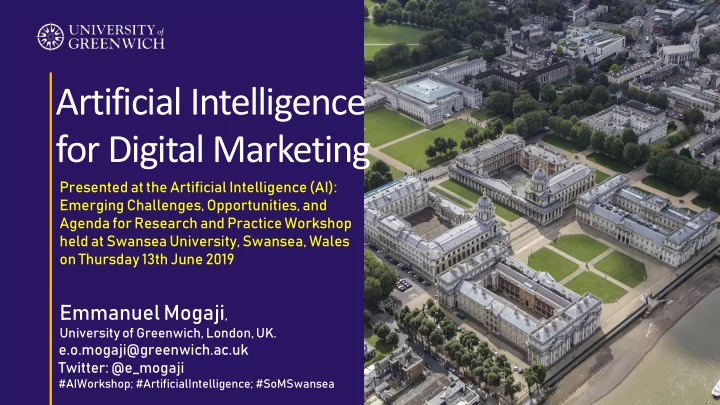

Artificial Intelligence for Digital Marketing Presented at the Artificial Intelligence (AI): Emerging Challenges, Opportunities, and Agenda for Research and Practice Workshop held at Swansea University, Swansea, Wales on Thursday 13th June 2019 Emmanuel Mogaji , University of Greenwich, London, UK. e.o.mogaji@greenwich.ac.uk Twitter: @e_mogaji #AIWorkshop; #ArtificialIntelligence; #SoMSwansea
Background Data ata, Use of mobile ile devi vice ce, Cl Cloud co computi uting ng and Int nterne rnet has • contributed to the significant development AI. AI is making a double-edged impact - constituting a significant • source of innovation yet threatening human jobs. AI is applicable in many different sector, Focus here is on AI for • digital marketing. AI ofers opportunities to enhances campaign creation, planning, • targeting, planning, and evaluation. Thr hree ke key stake keholders holders are identified as the opportunities for AI in • digital marketing are being explored.
Brands They need to understand their customers and communicate with them on a very personal and emotional level.
Agencies They are responsible for digital marketing strategies. They need AI to bridge the gap between the brands, the customers and data.
Consumers They need to engage with the brands’ marketing communications. They are the recipient of the information and the generator of the data which is being used to targeting.
Op Oppo portun rtuniti ities es • Data a - A large amount of data generated by the consumers provides an insight into their behaviour. Content ent Cre reation ion- There are opportunities for more • innovated and relevant content creation. • Co Cont nten ent t Sh Shari ring ng - With customers engagement and information collected, AI can be used to deliver contents.
Cha Challeng llenges es • The he Avai ailabil lability y of of Data a – Collecting and using the data may be challenging. GDPR and consumers’ willingness to release data. • Re Reso source urces - Though AI is getting much attention as a fast- developing technology, the cost needed to it for digital marketing may be a limiting factor. • Trust ust in n AI – Consumers don’t trust it. Advertising practitioners are feeling that the machine is not creative enough or it is going to take their jobs, Brand feelings they are losing grip over their narratives.
Res Resear earch ch Ag Agend enda • Conceptual and theoretical development • AI integration with online behavioural advertising (OBA) and mobile location-based advertising (MLBA). • Ethics • Content Creation • Attitude towards AI developed Campaigns • Stakeholders attitude towards AI for Digital marketing • Metrics and Evaluation
Conclusion AI offers enormous opportunities for key stakeholders. • AI helps marketing agencies gets a better understanding of • the data, to meet their goals and help brands connects emotionally to their customers. AI open opportunity for interdisciplinary collaboration • involving AI developers and creative individuals, enhancing the power of AI to develop appealing advertising campaigns. Research agenda provide theoretical and managerial • implications relevant for AI developers, marketers and brand managers.
Emmanuel Mogaji University of Greenwich, London. e.o.mogaji@greenwich.ac.uk @e_mogaji
Recommend
More recommend